
Politics in Portugal operates as a unitary multi-party semi-presidential representative democratic republic, whereby the Prime Minister of Portugal is the head of government, and the President of Portugal is the non-executive head of state with several significant political powers they exercise often. Executive power is exercised by the Government, whose leader is the Prime Minister. Legislative power is primarily vested in the Assembly of the Republic, although the government is also able to legislate on certain matters. The Judiciary of Portugal is independent of the executive and the legislature. The President exerts a sort of "moderating power", not easily classified into any of the traditional three branches of government.

The Socialist Party is a social-democratic political party in Portugal. It was founded on 19 April 1973 in the German city of Bad Münstereifel by militants who were at the time with the Portuguese Socialist Action. The PS is a member of the Socialist International, Progressive Alliance and Party of European Socialists, and has nine members in the European Parliament within the Progressive Alliance of Socialists and Democrats group during the 9th European Parliament. It has been the governing party of Portugal since the 2022 legislative election.

The CDS – People's Party is a conservative and Christian democratic political party in Portugal. It is characterized as being between the centre-right and right-wing of the political spectrum. In voting ballots, the party's name appears only as the People's Party, with the abbreviation CDS–PP unchanged.
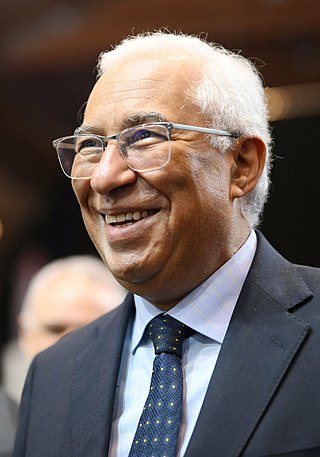
António Luís Santos da Costa is a Portuguese lawyer and politician who has served as the 119th prime minister of Portugal since 26 November 2015, presiding over the XXI (2015–2019), XXII (2019–2022) and XXIII Constitutional Governments. He is demissionary, having resigned on 7 November 2023 following an investigation in a corruption scandal.

Constituent Assembly elections were carried out in Portugal on 25 April 1975, exactly one year after the Carnation Revolution. The election elected all 250 members of the Portuguese Constituent Assembly.

The 1985 Portuguese legislative election took place on 6 October. The election renewed all 250 members of the Assembly of the Republic.

The Third Portuguese Republic is a period in the history of Portugal corresponding to the current democratic regime installed after the Carnation Revolution of 25 April 1974, that put an end to the paternal autocratic regime of Estado Novo of António de Oliveira Salazar and Marcelo Caetano. It was initially characterized by constant instability and was threatened by the possibility of a civil war during the early post-revolutionary years. A new constitution was drafted, censorship was prohibited, free speech declared, political prisoners were released and major Estado Novo institutions were closed. Eventually the country granted independence to its African colonies and begun a process of democratization that led to the accession of Portugal to the EEC in 1986.

The 2015 Portuguese legislative election was held on 4 October. All 230 seats of the Assembly of the Republic were in contention.
Events in the year 1996 in Portugal.
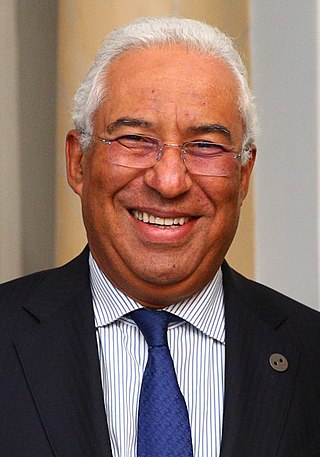
The 2019 Portuguese legislative election was held on 6 October 2019. All 230 seats to the Assembly of the Republic were contested.
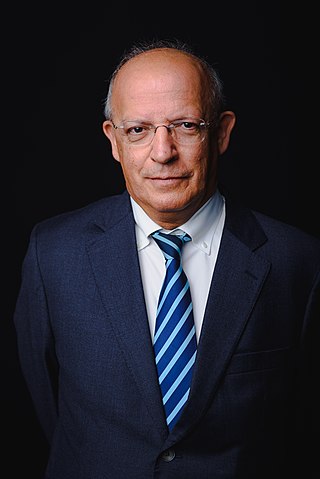
Augusto Ernesto dos Santos Silva is a Portuguese sociologist, university professor, and politician who has been the President of the Assembly of the Republic since 2022, in the 15th Legislature. From November 2015 to March 2022, he was the Portuguese Minister of Foreign Affairs, in the XXI and XXII Constitutional Governments led by Prime Minister António Costa.

Pedro Manuel Dias de Jesus Marques is a Portuguese politician of the Socialist Party (PS) who has been serving as Member of the European Parliament since 2019. He is currently the vice-president for the Group of the Progressive Alliance of Socialists and Democrats in the European Parliament. He previously served as Secretary of State for Social Security, between 2005 and 2011, and as Minister of Planning and Infrastructure in the government of Prime Minister António Costa, between 2015 and 2019.
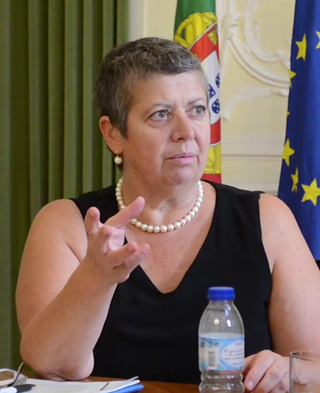
Ana Paula Vitorino is a Portuguese politician who most recently served as Minister of Maritime Affairs from 2015 to 2019, in the XXI Constitutional Government. She is a member of the Socialist Party. From 2005 to 2009, Vitorino served as the Secretary of State for Transport. Elected as a deputy in the Assembly of the Republic in the 2019 Portuguese legislative election she resigned in mid-2021, to be replaced by Sofia Andrade.
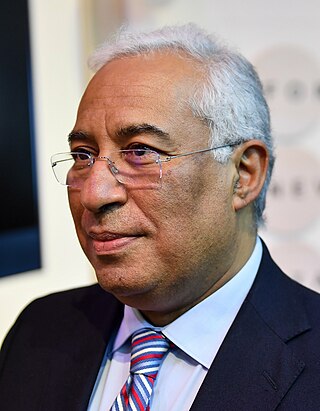
The XXII Constitutional Government of Portugal was the 22th government of the Third Portuguese Republic, under the current Constitution. It was established on 26 October 2019 as a Socialist Party (PS) minority government, led by Prime Minister António Costa, and ended on 30 March 2022.

Ana Catarina Veiga dos Santos Mendonça Mendes is a Portuguese politician of the Socialist Party (PS) who has been a deputy in the Portuguese Assembly of the Republic since 1995 and, from 2019, led the party in the National Assembly. In March 2022, she was appointed Minister of Parliamentary Affairs in the XXIII Constitutional Government.

The 2026 Portuguese presidential election will be held in January. This election will elect the successor of President Marcelo Rebelo de Sousa, as he is barred from running for a third term.

The XXIII Constitutional Government of Portugal is the current cabinet of the Portuguese government, the 23rd since the establishment of the current constitution. It was sworn in on 30 March 2022 as a Socialist Party (PS) majority government led by Prime Minister António Costa, following the 2022 legislative election.

Susana Amador is a Portuguese jurist and politician. As a member of the Portuguese Socialist Party (PS), she briefly became a deputy in the Portuguese Assembly of the Republic in 2005. She was elected to the Assembly again in 2015 and re-elected in 2019 and 2022. Between 2005 and 2015 she was a member of the Lisbon Metropolitan Council and mayor of Odivelas, a municipality in the Lisbon area. In 2019 she served as the Secretary of State for Education.
Ana Sofia Antunes is a Portuguese politician who, since 2015, has held the government position of Secretary of State for the Inclusion of Persons with Disabilities. Antunes was born blind.









































